Iranian, Qatari FMs Discuss Latest Status Of Nuclear Talks
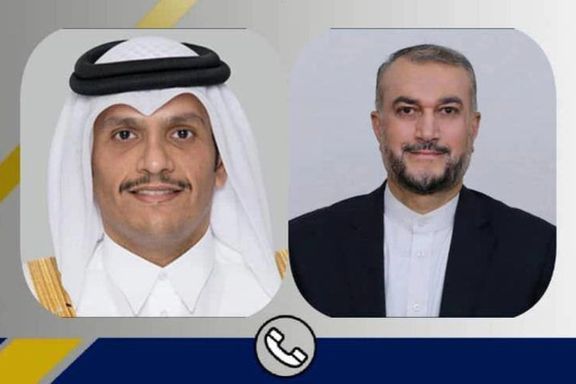
Iran’s foreign minister held a phone call with his Qatari counterpart to discuss the latest developments regarding the agreement to revive the 2015 nuclear deal.

Iran’s foreign minister held a phone call with his Qatari counterpart to discuss the latest developments regarding the agreement to revive the 2015 nuclear deal.
Hossein Amir-Abdollahian and Qatar’s Mohammed bin Abdulrahman Al Thani talked on Sunday night to review bilateral relations and some consular issues as well as the latest status of the negotiations to restore the Joint Comprehensive Plan of Action – or JCPOA.
According to Qatari sources, Al Thani reiterated Doha’s hope for Iran and the US to reach a consensus to revive the nuclear deal and reaching a fair agreement for all, taking into consideration the concerns of all parties. Al Thani also stressed that this agreement is in the interest of the security and stability of the region.
This was the second phone conversation between Amir-Abdollahian and Al Thani as the agreement on the JCPOA revival seems at a critical stage as Iran has hardened its position in recent days with insisting on demands, such as compensation if the US leaves the agreement or a pledge not to reinstate sanctions, but the Biden Administration has responded that it can only offer assurances to Tehran for the duration of its current term.
On Monday, Iran’s foreign ministry spokesman Nasser Kanaani reiterated Tehran’s harder position in the nuclear talks, insisting on guarantees and an end to a probe into its past activities, that Tehran has once again transmitted its latest to the European Union, which acts as a mediator, and is awaiting a response from Washington.
The United States on August 31 called Iran’s latest response “not constructive”, as soon as it was delivered on the same day.
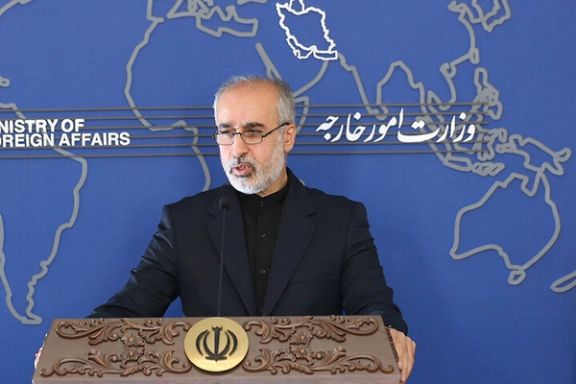
Iran’s foreign ministry Monday reiterated Tehran’s harder position in the nuclear talks, insisting on guarantees and an end to a probe into its past activities.
The ministry’s spokesman Nasser Kanaani told reporters that Tehran has once again transmitted its latest to the European Union, which acts as a mediator, and is awaiting a response from Washington.
United States on August 31 called Iran’s latest response “not constructive”, as soon as it was delivered on the same day.
Kanaani said that Iran’s demands regarding guarantees from the United States had some success in terms of “strengthening” the existing draft agreement text circulated by the EU. He stressed that the foreign ministry’s most important task is to secure guarantees.
Iran has been asking for US guarantees not to leave a new nuclear agreement, as it did in 2018 when former President Donald Trump withdrew from the Joint Comprehensive Plan of Action, JCPOA. Reports in recent weeks have indicated a variety of Iranian demands, such as compensation if the US leaves the agreement or a pledge not to reinstate sanctions, but the Biden Administration has responded that it can only offer assurances to Tehran for the duration of its current term.
Almost all Republicans in the US Congress and many Democrats have serious reservations about a new nuclear deal with Iran that would lift sanctions and provide hundreds of billions of dollars to a government that they believe poses a danger to US interests and its regional allies. Republicans have vowed to “tear up” any agreement President Joe Biden concludes with Iran short of a complete dismantling of its nuclear program and a major shift in its regional policies.
Kanaani also highlighted another demand that Tehran has put forth in recent weeks. He insisted that a probe by the International Atomic Energy Agency (IAEA) should be shelved before a deal is implemented. The IAEA is investigating uranium particles its inspection uncovered at three Iranian nuclear sites used prior to 2003, when Tehran was pursuing an undeclared research and development program.
Iran’s public pronouncements in the past two weeks have been shifting between emphasizing ‘guarantees’ and stopping the IAEA investigation as pre-conditions for a deal.
The foreign ministry spokesman also emphasized another argument being pushed by Iranian officials that Europe is facing an energy crisis this winter and is desperate for a nuclear deal with Iran. Presumably, if US sanctions are lifted Iran can supply energy to Europe in the wake of the crisis created by Russia’s invasion of Ukraine.
However, this is a false proposition built on the premises that Iran can supply natural gas to Europe in the near future.
First, Iran’s gas production is not enough even for its domestic consumption, because of a lack of Western technology and capital. Natural gas output is gradually declining while domestic consumption is rising.
In fact, Iran might soon be forced to import gas if it does not invest $50 billion in its production fields, which need technology only Western countries can provide.
Second, even if Iran had additional gas to export to Europe, there are no land pipelines ready and no LNG infrastructure to ship the gas via the sea.
Kanaani claimed that Europe has asked Iran for help to resolve the energy crisis and also mediate with Russia to stop the war in Ukraine, but so far there have been no statements by European officials in these regards.
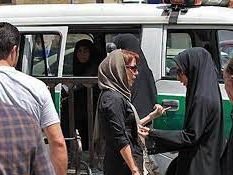
An Iranian government entity enforcing Islamic rules says the intelligence ministry has arrested 300 anti-hijab activist “ringleaders” working “for the enemy.”
Ali Khan-Mohammadi, spokesman of the Enjoining Good and Forbidding Evil Headquarters, said Sunday the activists who worked for “the enemy” and “combated the Islamic Republic’s hijab rules in various ways” were arrested in concurrence with the implementation of the Hijab and Chastity Regulations in government offices, he added.
He did not provide more details, but some social media activists and women who removed their headscarves in public as a sign of protest have been arrested since mid-July.
Hardline media say implementation of the Hijab and Chastity Regulations will soon be more strictly applied in other establishments such as shopping centers. Authorities are also giving more power to law enforcement, security guards in public parks, as well as ordinary citizens to admonish those whose appearance does not conform with the prescribed dress code.
Although the government says “admonishment”, but special morality police scouting the streets actually arrest women for violating the Islamic dress code.
Harsher than usual enforcement of the hijab in the past few months has raised protests from many in Iran including some moderate religious and political figures.
In early July President Ebrahim Raisi ordered the implementation of stricter regulations. He put an ideological spin on the issue and accused foreign enemies of the Islamic Republic and Islam of using extensive satellite TV and social media networks to “target the society’s cultural backbone and foundations of its religious values.”
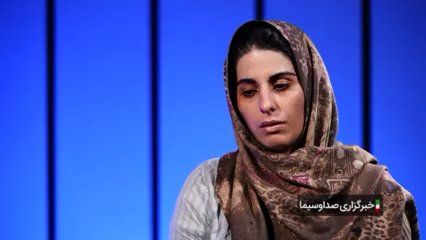
Khan-Mohammadi, a low-ranking cleric, also alleged that “the enemy” conducts intensive cultural activities against the hijab, including through importing goods and clothing that are against the society’s Islamic norms, and thanked security and intelligence forces for neutralising such plots.
There is no evidence of any foreign conspiracy, except some Iranian activists in the West campaigning against compulsory hijab. One such activist in the United States was even reportedly targeted for kidnapping or assassination by Islamic Republic agents.
The staff of the Enjoining Good and Forbidding Evil Headquarters are trained and responsible for admonishing or detaining citizens, particularly women if Islamic regulations, including hijab rules, are ignored or not abided by.
In the past few months women and anti-hijab activists have come under such intense pressure that even many women who wear the hijab by choice have joined a social media campaign against forced hijab and hijab enforcement street patrols.
Sepideh Rashno, a 28-year-old artist and writer, for instance, was arrested because of an acrimonious dispute with a hijab enforcer in a city bus on July 16 and posting a video of her quarrel with the hijab enforcer on social media which went viral.
She was tortured into denouncing herself and other activists, expressing regrets for her confrontation with the hijab enforcer, and posting the video on social media.
Rashno has not been put on trial yet, but her so-called “confessions” were aired by the state-run television (IRIB) soon after her arrest. She had been so badly beaten before the telecast that bruises were quite visible on her face.
Rashno has been charged with “association and collusion with the intention of committing a crime against the country's security through communication with foreigners and propaganda activity against the Islamic Republic and encouraging people to commit corruption and prostitution" and “propaganda against the Islamic Republic”. Authorities have set Rashno’s bail at a very high sum of 8 billion rials.
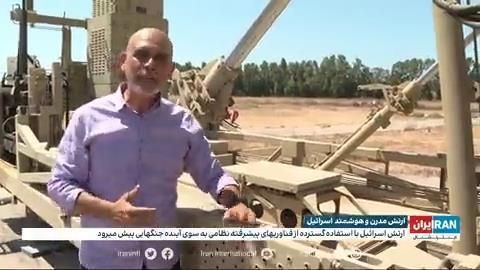
The Israeli military authorized Iran International’s team to film and report at an Iron Dome base, making it the first Persian-language channel inside the defense system.
The online outlet for the Israeli Yedioth Ahronot newspaper, Ynet, published an article on Saturday, reporting that the Israeli Defense Forces had allowed Iran International to visit the site.
Against the background of the mutual threats between Israel and Iran, and attempts to restore the nuclear agreement, the IDF for the first time authorized the cameras of a channel broadcasting in Persian to enter an Iron Dome base, Ynet said, adding that “The channel's reporter even spoke in Hebrew with fighters and commanders at the base.”
Mashregh News, a website in Tehran affiliated with Iran’s Revolutionary Guard reported on this development, harshly attacking Iran International for visiting an Israeli military installation, while the country is threatening Iran with an attack.
The report by the channel’s correspondent Babak Es’haghi (Babak Itzhaki) was broadcast from inside a base near the Gaza border this week.
Iron Dome is a mobile all-weather air defense system designed to intercept and destroy short-range rockets and artillery shells.
The Iron Dome missile defense system successfully intercepted 97 percent of incoming rockets launched by the Iran-backed Palestinian Islamic Jihad group in their latest bout of violence in August.
On Sunday, Israeli Prime Minister Yair Lapid said the country is leading “an intensive campaign” meant to prevent the signing of “a dangerous” nuclear deal between Iran and world powers.
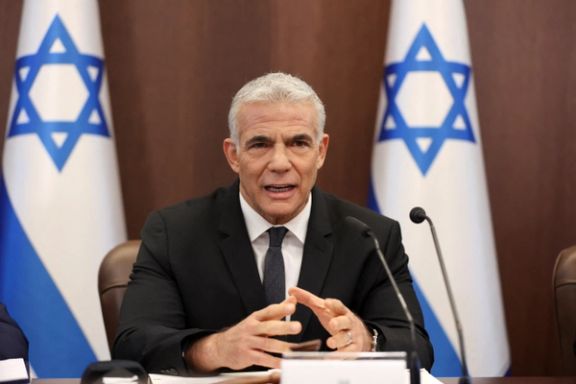
Israeli Prime Minister Yair Lapid says the country is leading “an intensive campaign” meant to prevent the signing of “a dangerous” nuclear deal between Iran and world powers.
At the start of Sunday’s cabinet meeting, Lapid said Israel will continue to pressure the US but not to the point that it will cause a crisis in relations. “The correct policy is the one that we have been leading in the past year: To continue the pressure, without causing a rupture, to present credible intelligence, to be part of the process without destroying the special relationship with the US.”
Lapid said to “those who say that we are not shouty enough or blunt enough” should recall that, in 2015, when then-prime minister Benjamin Netanyahu “insisted on an unnecessary confrontation [with the US], it was an utter failure. The Americans simply stopped listening to us.
“The reservations we presented to the US were taken into account. We also spoke to other partners and presented demands [they should make of] Iranians. We can’t say everything, but not everything should be subject to fights and speeches,” he added.
President Joe Biden told Israeli Prime Minister Yair Lapid last week that the United States will never allow Iran to acquire a nuclear weapon. Israel opposes a return to the 2015 deal, which would lift sanctions on Iran and would limit its nuclear program for a few years.
Lapid made the remarks one day before the Mossad chief is set to depart for Washington to attend closed door classified meetings of House and Senate intelligence committees about the Iranian threat and the dangers of a nuclear deal.

Mohammad Marandi, who acts as de facto spokesman for Iran's nuclear negotiating team, has tried to link energy needs in Europe to ongoing talks for reviving the 2015 agreement.
Marandi published a series of tweets from his interview with Al Jazeera news channel on Saturday, saying, “Iran will be patient. The US under Obama systematically violated the deal and under Trump/Biden it imposed maximum pressure against innocent citizens... Winter is approaching and the EU is facing a crippling energy crisis.”
Emphasizing that “Iran won't accept ambiguities or loopholes in the text,” he said, “There should be no loopholes that can be used to undermine a deal. There are problems with a few words and the US can easily fix them.”
“The US domestic situation is a key reason why a nuclear deal has been allusive (elusive). While some EU governments have already asked Iran about oil as well as natural gas exports, Biden is fearful that foes will depict him and certain allies as weak,” he added.
Tehran is trying to sell the agreement as beneficial to Europe's energy crunch, regardless of the fact that even with no sanctions or restrictions on Iran’s exports, the country is unable to provide European countries with natural gas.
Iranian media repeatedly talks about ‘Europe’s freezing winter” while it has almost nothing to do with Tehran’s crude oil exports, except generally helping to bring down oil prices. Europe’s need to replace Russian gas is a specific issue on its own that Iran cannot help with due to its own shortages. A nuclear agreement now cannot impact Iran’s ability to export natural gas for the foreseeable future mainly due to Iran’s huge domestic need.